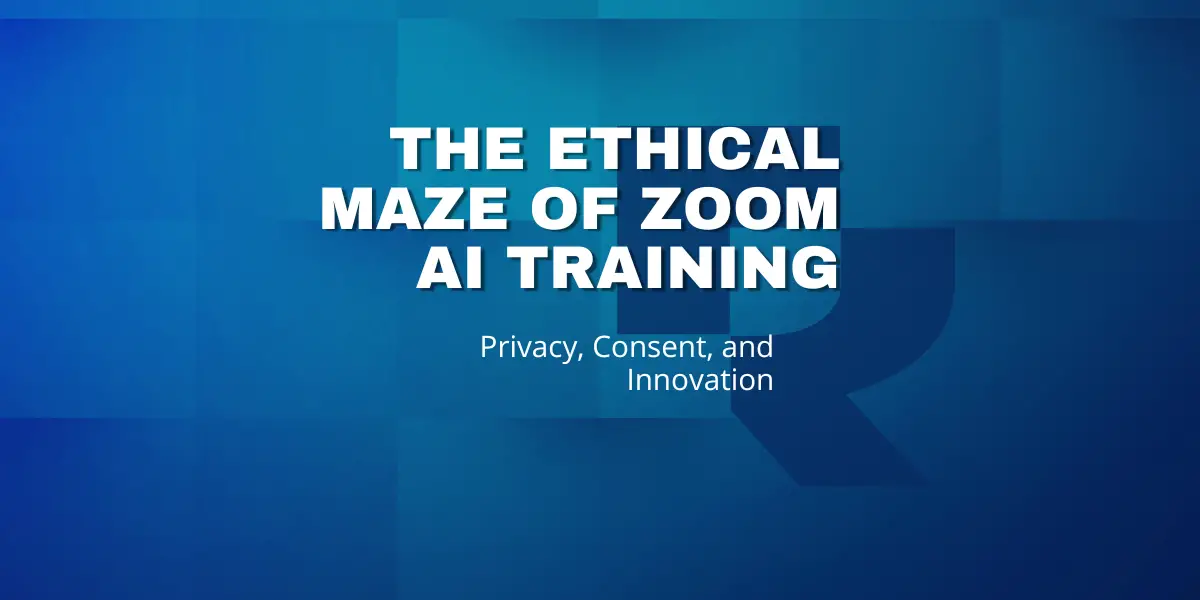The Ethical Maze of Zoom AI Training: Privacy, Consent, and Innovation

The integration of Artificial Intelligence (AI) into our daily lives is a double-edged sword. While it offers unprecedented convenience and efficiency, it also raises complex ethical and privacy concerns. Zoom, a leading video conferencing platform, has recently found itself at the center of this debate. Its changes to terms of service regarding AI training have ignited a conversation that goes beyond technology, touching on fundamental human rights and societal values.
Table of Contents
Background of Zoom's AI Training Policy
In March 2023, Zoom announced a significant update to its terms of service. This update included a provision allowing the company to use customer data, including audio, video, and chat content, for AI training purposes. The goal was to enhance the efficiency and accuracy of Zoom’s services, but the change was met with immediate concern.
User Concerns and Reactions
The policy change sparked widespread public apprehension. Users were not only worried about how their private conversations might be used but also about the broader implications for privacy and consent. The change raised critical legal and ethical questions:
- Transparency: Was Zoom transparent enough about how user data would be used?
- Consent: Did users have a real choice, or was consent merely a formality?
- Security: How would Zoom ensure that the data used for AI training would remain secure?
Zoom's AI Tools and Their Applications
Zoom’s AI tools, such as IQ Meeting Summary and IQ Team Chat Compose, were at the heart of this policy change. These tools can provide automated meeting summaries and assist users in composing messages, offering a more streamlined user experience. However, the introduction of these tools raised several key concerns:
- User Autonomy: Should users have the right to opt-out of these features?
- Data Usage: How would Zoom ensure that data used for AI training would not be misused or shared with third parties?
- Ethical Considerations: What ethical guidelines were in place to govern the use of AI within the platform?
See more:Kundli GPT Login,Sign Up,Access,How to Use Tutorial:ALL IN ONE
Zoom's Response and Policy Reversal
Faced with criticism, Zoom acted quickly to clarify its position. The company emphasized that it would not use customer content for AI training without explicit consent and updated its terms to define the scope and limitations of data usage more clearly. This response, however, left some unanswered questions and continued to fuel the debate about the ethical use of AI.
Privacy vs. Innovation: An Ongoing Debate
Zoom’s situation is a microcosm of a larger, ongoing debate about the balance between privacy and innovation. As companies strive to innovate, they must also navigate complex ethical landscapes. This incident with Zoom raises essential questions for the tech industry and society at large:
- Regulation: What role should government and regulatory bodies play in overseeing the ethical use of AI?
- Corporate Responsibility: How can companies innovate responsibly, ensuring that technological advancement does not come at the expense of user rights?
- Public Awareness: How can the public be educated and empowered to make informed decisions about their data?
Also read:What is Chai App:Chat with AI Friends
Conclusion
The Zoom AI training policy change serves as a critical case study in the complex interplay between technology, ethics, privacy, and innovation. It reminds us that as we embrace the conveniences of modern technology, we must also grapple with its ethical implications.
As AI continues to permeate various aspects of our lives, the need for clear guidelines, transparency, and a user-centric approach becomes paramount. The lessons learned from Zoom’s experience should resonate with tech companies, policymakers, and users alike, guiding us as we navigate the uncharted waters of technological innovation in an increasingly interconnected world.

